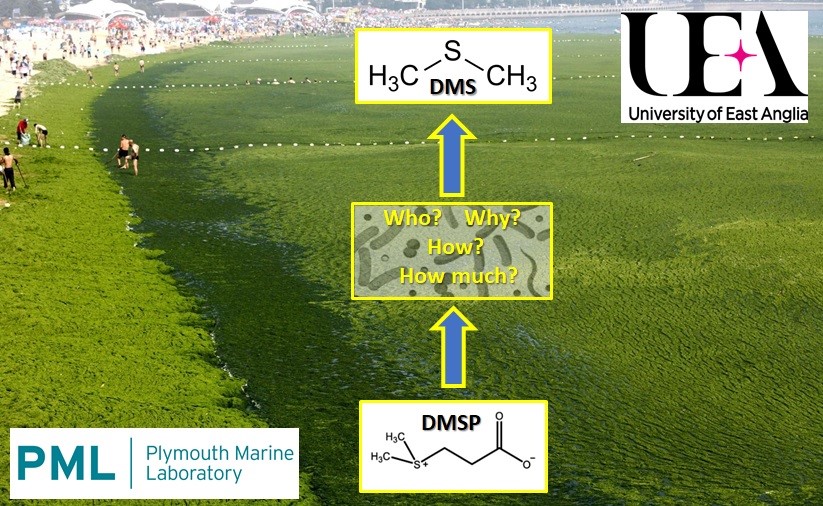PhD Opportunity: Climate-linked microbial interactions in green tide causing seaweed
Supervisors
Dr Mahasweta Saha (Plymouth Marine Laboratory)
Prof Jonathan Todd (School of Biological Sciences, University of East Anglia)
Dr Frances Hopkins (Plymouth Marine Laboratory)
How to apply
Read more about this opportunity and find out how to apply on the ARIES website.
Introduction
Dimethylsulfoniopropionate (DMSP) is one of Earth’s most abundant organosulfur molecules and Ulva seaweeds, which cause green tides, are prolific DMSP producers. Ulva species produce DMSP as an anti-stress compound and can cleave DMSP to liberate the climate-cooling gas dimethylsulfide (DMS), but the precise role of DMSP in Ulva is unclear. Furthermore, DMSP released by Ulva into the environment has roles in signalling and recruiting beneficial bacteria, which use DMSP as a nutrient and facilitate further DMS production.
This project will use multidisciplinary techniques to explore how and why Ulva makes and degrades DMSP and to study its interactions with associated bacteria that utilise the DMSP Ulva produces.

Methodology
You will use oceanographic sampling to establish a laboratory stock of Ulva lactuca which you will learn to cultivate under varied environmental conditions at Plymouth Marine Laboratory (PML) with Saha. Analytical techniques, e.g. chromatography and mass spectroscopy, will be used to quantify Ulva DMSP synthesis and catabolic rates, with training provided by Hopkins at PML. At UEA you will characterise the expression and activity, respectively, of key Ulva DMSP synthesis and lyase genes/enzymes by PCR-based techniques and enzymology with Todd. You will be trained by Todd in cutting-edge molecular ecology, e.g. DNA-stable isotope probing and metagenomics, to identify microbes that utilise DMSP for carbon from Ulva samples and their catabolic pathways. Finally, culture-dependent molecular microbiology will be used to characterise model DMSP-degrading microbes isolated from Ulva. This project will represent the first molecular microbiological study of organosulfur cycling by green tide-causing Ulva that produces exceptionally high DMSP levels.
Training
You will receive exceptional training at PML and UEA in molecular ecology and microbiology, bioinformatics, analytical chemistry, coastal marine fieldwork and in writing high impact publications. You will learn good laboratory practice, quality assurance, and receive health and safety training. You will present your findings at weekly team meetings, high-profile international scientific conferences, and in peer-reviewed scientific publications and your PhD thesis.
Person specification
We require a committed, pro-active, and self-reliant candidate keen to master a wide range of techniques. Experience in some of the key components including chemistry is desirable.
Acceptable first degree subject(s)
Biological, Environmental, Chemical, Marine or Atmospheric Science
Keywords
Bioinformatics; Ecology; Environmental Biology; Marine Biology; Microbiology; Molecular Biology; Molecular Genetics; climate science;
Useful information
Length: 3.5 years
Start date: October 2023
Application deadline: 23:59 on 11 January 2023
Full or part time role
Project code: SAHA_UPML23AN
Funding notes
This project has been shortlisted for funding by the ARIES NERC DTP.Successful candidates who meet UKRI’s eligibility criteria will be awarded a NERC studentship, which covers fees, stipend (£17,668 p.a. for 2022/23) and research funding. International applicants are eligible for fully-funded ARIES studentships including fees. Please note however that ARIES funding does not cover additional costs associated with relocation to, and living in, the UK.
ARIES students benefit from bespoke graduate training and ARIES provides £2,500 to every student for access to external training, travel and conferences, on top of all Research Costs associated with the project. Excellent applicants from quantitative disciplines with limited experience in environmental sciences may be considered for an additional 3-month stipend to take advanced-level courses
ARIES is committed to equality, diversity, widening participation and inclusion in all areas of its operation. We encourage enquiries and applications from all sections of the community regardless of gender, ethnicity, disability, age, sexual orientation and transgender status. Academic qualifications are considered alongside significant relevant non-academic experience.
For further information, please visit www.aries-dtp.ac.uk
References
1. Saha, M., Rempt, M., Gebser, B., Grueneberg, J., Pohnert, G. & Weinberger, F. (2012) Dimethylsulphopropionate (DMSP) and proline from the surface of the brown alga Fucus vesiculosus inhibit bacterial attachment. Biofouling 28: 593–604.
2. Jingli Liu, Chun-Xu Xue, Jinyan Wang, Andrew T. Crombie, Ornella Carrión, Andrew W. B. Johnston, J. Colin Murrell, Ji Liu, Yanfen Zheng, Xiao-Hua Zhang, Jonathan D. Todd. (2022) Oceanospirillales containing the DMSP lyase DddD are key utilisers of carbon from DMSP in coastal seawater. Microbiome 10 (110)
3. Curson ARJ, Williams BT, Pinchbeck BJ, Sims LP, Martínez AB, Rivera PPL, Kumaresan D, Mercadé E, Spurgin LG, Carrión O, Moxon S, Cattolico RA, Kuzhiumparambil U, Guagliardo P, Clode PL, Raina JB, Todd JD. (2018). DSYB catalyses the key step of dimethylsulfoniopropionate biosynthesis in many phytoplankton. Nature Microbiology 4: 430-439.
4. Curson ARJ, Todd, JD, Sullivan MJ and Johnston AWB (2011). Catabolism of dimethylsulfoniopropionate: microorganisms, enzymes and genes. Nature Reviews Microbiology 9: 849-859.
5. Hopkins, F. E., Nightingale, P. D., Stephens, J. A., Moore, C. M., Richier, S., Cripps, G. L., & Archer, S. D. (2020). A meta-analysis of microcosm experiments shows that dimethyl sulfide (DMS) production in polar waters is insensitive to ocean acidification. Biogeosciences 17, 163–186.